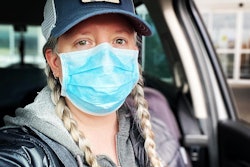
James Valdez recovered from COVID-19 but still has a cough and “my nasal passages are totally different now.” David Wheat is regaining his sense of taste, but still can’t smell anything. Anthony McCarty barely suffered, but his wife “gets up in the morning as tired as when she went to bed.” Sarah Sauseda has trouble digesting food and still has a low oxygen level.
The symptoms these truckers or their family members continue to experience are common for COVID patients: dry cough, shortness of breath, fatigue, body aches, headaches, loss of smell and taste, and a digestive system that slows down to the point of making it difficult to eat.
Though most of these four drivers are not too many weeks removed from testing positive for COVID late last year, they could be considered COVID long-haulers. The name, borrowed from the world of trucking, is now widely applied to those who suffer symptoms for weeks or months after getting past the initial illness. There is no clear definition for how long the persistence must be or how severe the symptoms before a survivor is considered a long-hauler, said a recent Scientific American article.
In one study based on 4 million respondents in the U.K., about 10% had persistent symptoms for a month, and 1.5% to 2% felt them for three months. A much smaller Italian study, based on survivors who had been hospitalized, “found that only about one in eight was completely free of symptoms 60 days from the beginnings of the illness,” reported Scientific American.
 “I did not think I was going to be able to come back to work.
“I did not think I was going to be able to come back to work.
He still has an occasional cough and notices how his respiratory system is affected by extreme temperature changes, such as getting in and out of his truck in frigid climes. His system will be “so sensitive and dry and burning, and a minute later, I’ll be stuffy,” Valdez said. “It’s like I have allergy season every day.”









